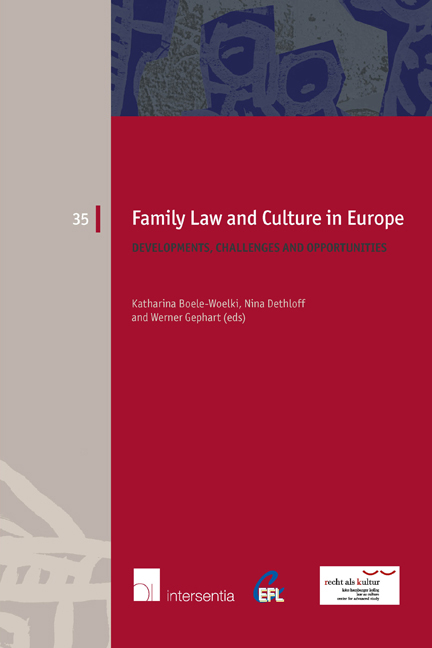Book contents
- Frontmatter
- Preface
- Contents
- List of Authors
- PART ONE THE CEFL PRINCIPLES ON PROPERTY RELATIONS BETWEEN SPOUSES
- General Rights and Duties in the CEFL Principles on Property Relations between Spouses
- Marital Property Agreements
- The Participation in Acquisitions Regime
- The Community of Acquisitions Regime
- PART TWO BREAKUP OF (NON-)FORMALISED RELATIONSHIPS
- PART THREE NEW CONCEPTS OF PARENTAGE
- PART FOUR INTERNATIONAL FAMILY RELATIONSHIPS
- PART FIVE TRANSNATIONAL FAMILIES: ACROSS NATIONS AND CULTURES
- EUROPEAN FAMILY LAW SERIES
The Participation in Acquisitions Regime
from PART ONE - THE CEFL PRINCIPLES ON PROPERTY RELATIONS BETWEEN SPOUSES
Published online by Cambridge University Press: 22 November 2017
- Frontmatter
- Preface
- Contents
- List of Authors
- PART ONE THE CEFL PRINCIPLES ON PROPERTY RELATIONS BETWEEN SPOUSES
- General Rights and Duties in the CEFL Principles on Property Relations between Spouses
- Marital Property Agreements
- The Participation in Acquisitions Regime
- The Community of Acquisitions Regime
- PART TWO BREAKUP OF (NON-)FORMALISED RELATIONSHIPS
- PART THREE NEW CONCEPTS OF PARENTAGE
- PART FOUR INTERNATIONAL FAMILY RELATIONSHIPS
- PART FIVE TRANSNATIONAL FAMILIES: ACROSS NATIONS AND CULTURES
- EUROPEAN FAMILY LAW SERIES
Summary
THE PARTICIPATION IN ACQUISITIONS APPROACH
Participation in acquisitions is one of the two matrimonial property regimes found in the CEFL Principles (4:16 to 4:32). It forms the first part of Chapter III: matrimonial property regimes. The CEFL chose the label ‘participation in acquisitions’ because it expresses the two main features of the regime: establishing a participation which is, however, restricted to the acquisitions.
When comparing the existing participation regimes, the CEFL primarily looked at the existing regimes described in the national reports. In Catalonia the default regime is the separation of property, with, however, a compensation claim in the case of divorce. In Catalonia there is also an optional regime of participation in acquisitions. Also under French law participation in acquisitions is only an optional regime. Several jurisdictions have opted for a participation regime as a default matrimonial property regime. In Greece the default system is a participation in acquisitions. Of particular interest was the Swiss system of participation in acquisitions (Errungenschaftsbeteiligung). In Germany we find a comprehensive system entailing a so-called community of accrued gains (Zugewinngemeinschaft).
At a later stage the solutions of the French-German Agreement of 2010 instituting an optional regime of participation in accrued gains were also taken into account. This bilateral agreement is of interest as it combines a primary regime (regime primaire) similar to French law with a participation in accrued gains closely based on the German model. The Nordic systems of deferred community and the redistribution of property in common law jurisdictions have also been taken into account. However, because the national reports were restricted to the two national regimes most used in practice, the CEFL did not receive that many national reports dealing in detail with a participation regime.
The issue of the best default regime was one of the points of discussion in earlier meetings of the CEFL experts. Despite a certain tendency to choose the participation in acquisitions regime as the Principles’ default regime – participation in acquisitions is applicable in 11 of the analysed jurisdictions – it is presented on an equal footing together with the community system.
- Type
- Chapter
- Information
- Family Law and Culture in EuropeDevelopments, Challenges and Opportunities, pp. 25 - 36Publisher: IntersentiaPrint publication year: 2014

